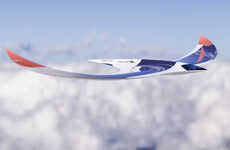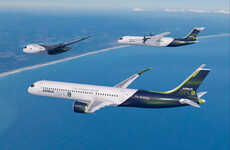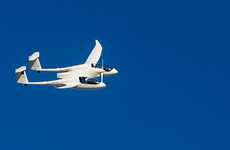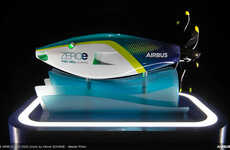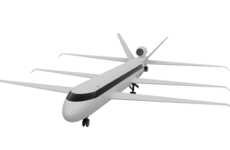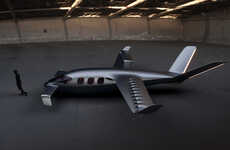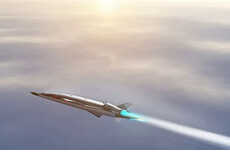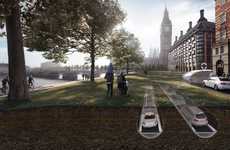
The 'Hyper Shape Plane' is Powered by Solar Panels on the Top
Michael Hemsworth — May 19, 2017 — Art & Design
References: yankodesign
Looking like more of a mothership than a traditional airplane, the 'Hyper Shape Plane' is a newly designed aircraft by Oscar Viñals that works to draw energy from unexpected sources to fly forward.
The HSP is designed with quantum solar dots on the upper surfaces of the plane in order to draw energy from the sun, while wind turbines help to harness the power of the wind. Air ducts above the cockpit work to allow air to pass through that will capture and remove CO2 from the atmosphere in order to store it in liquid form for recycling once the plane lands.
The 'Hyper Shape Plane' comes as an efficient concept that identifies the way in which air travel is heading when it comes to energy sources and levels of efficiency.
The HSP is designed with quantum solar dots on the upper surfaces of the plane in order to draw energy from the sun, while wind turbines help to harness the power of the wind. Air ducts above the cockpit work to allow air to pass through that will capture and remove CO2 from the atmosphere in order to store it in liquid form for recycling once the plane lands.
The 'Hyper Shape Plane' comes as an efficient concept that identifies the way in which air travel is heading when it comes to energy sources and levels of efficiency.
Trend Themes
1. Solar-powered Air Travel - There is an opportunity to develop more zero-emissions airplanes powered by solar panels in order to reduce the carbon footprint of air travel and utilize renewable energy sources.
2. Wind Energy in Aviation - The integration of wind turbines in airplanes can be a disruptive innovation for the aviation industry by harnessing the power of the wind to reduce energy consumption and emissions.
3. Carbon Capture in Air Travel - The concept of capturing CO2 from the atmosphere during flights and storing it in liquid form for recycling can be a potential disruptive innovation in the aviation industry to reduce carbon emissions and contribute to a sustainable future.
Industry Implications
1. Aviation - The aviation industry can utilize solar and wind energy to power planes in order to reduce their carbon footprint and energy consumption, making it a disruptive innovation for the industry.
2. Renewable Energy - The renewable energy industry can play a major role in developing and providing the necessary technology and infrastructure to power zero-emissions airplanes with solar and wind energy.
3. Carbon Capture and Storage - The carbon capture and storage industry can potentially collaborate with the aviation industry to develop innovative solutions for capturing CO2 during flights and storing it for recycling.
6.3
Score
Popularity
Activity
Freshness

